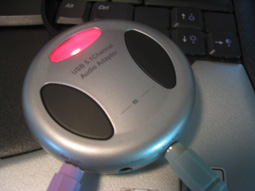GWC Tech 5.1 USB Audio Adapter
GWC Tech has introduced the 5.1 Channel USB Stereo Adapter, a tiny device that can be used to digitize incoming analog devices or to play analog input through computer speakers in 5.1 sound. Basically, we are talking about an external USB sound card for a computer, in particular for a laptop. The Stereo Adapter can also function as a piece of external hardware that does the analog to digital conversion for you, so you don't need to use CPU power to convert. Although the idea sounds great, there are some minor problems that make the Stereo Adapter a useless device for digitizing analog sources.
The GWC Stereo Adapter's Easy Install
Using a standard USB connection, the Stereo Adapter can be connected to your computer in seconds. Included with the device is control panel software which is used to control the recording and digitizing you do. I plugged the Stereo Adapter into my Windows XP laptop. It was recognized instantly and the driver was installed.
Recording from a Stereo: Dropouts
For my first test, I connected the tape from my stereo amplifier to the line in input of the Stereo Adapter, using a Y cable. I played the music from my stereo and recorded the sound using the supplied software. By hitting ‘record,' the software is supposed to do the analog to digital conversion. I tried a Jankowski record. Hoping to hear A Walk in the Black Forest, I played my file. Dropouts! The song would play for a few seconds normally, but then jump a few seconds ahead. The amount of times that this occurred was appreciable.
Lack of Bandwidth for GWC Stereo Adapter
What was causing these dropouts? One of the stupidest things I noticed about the device was that it was made for USB 1.1. Why not 2.0? It's highly possible that the dropouts were due to lack of bandwidth, but it's also possible that they could be caused by lack of sufficient CPU power. I ran these tests on a Pentium IV 1.8 Ghz laptop running XP with 256 RAM. Even though this is not the best rig, the system requirements only call for an operating system, said best to work under XP. What's going on?
Using the GWC Stereo Adapter as an External Sound Card
By connecting my speakers to the front audio port, I was able to play music coming from my analog input through my computer speakers. Vice versa, I was also able to play my audio files stored on my computer through the stereo speakers. If you are looking for a simple external USB sound card, this can be a great thing for you.
Testing the GWC Stereo Adapter on a Better CPU
I asked GWC support what the dropouts could be caused by. Their helpful and friendly support told me that it could be caused because of a lack of CPU power or most probably because the laptop USB adapter was outdated. I connected the adapter to a PC with an AMD 2.2 Ghz processor and a gig of RAM. I was able to record multiple tracks, much better than the laptop had done. I got the sound to be 100 times better by making the volume lower. There were still a few random skips, but it was an amazing difference. This adapter would not be useful for digitizing your whole analog collection because of the occasional dropouts, but for one time it would be adequate.
Using the GWC Stereo Adapter for 5.1 Channel Sound
The last test I ran on the Stereo Adapter was playing 5.1 channel sound from the laptop. I popped in the Pink Panther DVD, and set up the Stereo Adapter. By connecting the two input wires from the speakers to the front audio and rear audio jacks on the Stereo Adapter, I was able to achieve surround sound. Very cool.
Overall
The USB 5.1 Stereo Adapter from GWC Tech is an interesting product. It doesn't quite do what it says it does, however, it does do some other things very good. The analog to digital conversion didn't work out as well as I hoped, as there were a lot of dropouts. I was successfully able to play sound from my computer through my stereo or vice versa, and able to get surround sound on my laptop. If you are looking for an external USB sound card, the GWC Stereo Adapter will work great for you. For analog to digital conversion, it looks like you are going to have to find something else.


